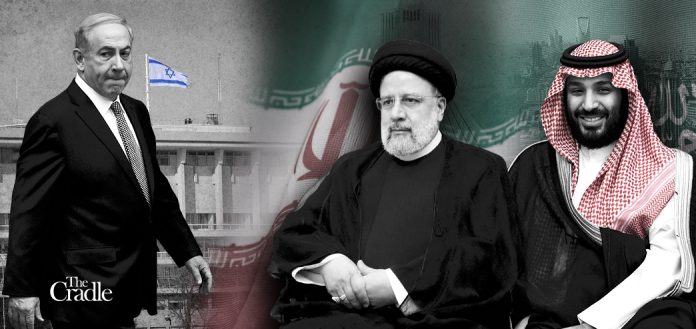Iran’s President Ebrahim Raisi said in a U.S. television interview on Sunday that U.S.-sponsored efforts to normalise Israeli relations with Gulf Arab states, including Saudi Arabia, “will see no success”.
In an interview with CNN, Raisi also said Iran had not said it does not want nuclear inspectors from the United Nations’ nuclear watchdog in the country.
Raisi has said Iran has no issue with the U.N. nuclear watchdog’s inspection of its nuclear sites, days after Tehran barred multiple inspectors assigned to the country.
Israel has moved closer to the United Arab Emirates, Bahrain, Sudan and Morocco following a U.S.-driven diplomatic initiative in 2020 which pushed for normalization of relations.
READ ALSO: Quds Force commander general Esmail Qaani visits Syria
Establishing ties with Saudi Arabia – home to some of Islam’s holiest sites – would be the grand prize for Israel and change the geopolitics of the Middle East.
Commenting on Iran’s nuclear programme, Raisi said:
“We have announced time and time again that the use of nuclear weapons, the use of weapons of mass destruction in general, do not have a place. Why? Because we don’t believe in it, nor do we have a need for it.”
“The Islamic Republic of Iran hasn’t said we do not wish any inspectors to be here.”
It was earlier reported that, The recent rapprochement between regional arch-rivals Saudi Arabia and Iran has added a new layer to the already complicated geopolitical landscape in West Asia, especially as the kingdom was once touted to be the next major Arab state to normalize relations with Israel.
Signed in March, the Chinese-brokered agreement, which reestablishes diplomatic relations and reopens embassies in Riyadh and Tehran after a seven-year hiatus, is seen by many as a watershed moment that could potentially reduce bilateral animosity and ease tensions throughout the region.
However, the deal has caused great dismay in Tel Aviv and caught Prime Minister Benjamin Netanyahu off guard.
It is understandable why Israel is disappointed, as the prioritization of the Abraham Accords has been a cornerstone of Israeli foreign policy in recent years. The accords, initially involving Israel, the UAE, and Bahrain in 2021, was a major foreign policy victory for Netanyahu and part of a broader strategy to isolate Iran in the region.
And normalizing relations with Saudi Arabia, the most influential Arab state today, would have solidified Israel’s ambition to establish diplomatic ties with its Arab neighbors and further enhance its diplomatic influence in West Asia.
Regional stability: A setback for Israel
Consequently, the Saudi-Iran deal is viewed by many observers as a setback to Israel’s ambitions, with some analysts even perceiving it as a diplomatic victory for the Iranians. Importantly, Riyadh’s resumption of diplomatic ties with Tehran has shifted perceptions across the Arab region, creating conditions that make the Saudis joining the Abraham Accords less likely than ever.
Equally, the resetting of relations does not necessarily mean that Iran and Saudi Arabia are putting their differences aside. As Professor Shahram Akbarzadeh of the Middle East Studies Forum at Deakin University, explains to The Cradle, “It does mean that both countries realize that escalation of tensions and the prospects of all-out conflict would be detrimental for both.”
He emphasizes that “diplomatic ties ensure viable lines of communication to ensure the cold war between the two remains on ice.”
Matteo Colombo, a researcher at Clingendael’s Conflict Research Unit, concurs, saying that a major indirect consequence of the shift in the Saudi-Iranian relationship is that regional conflicts are likely to become less violent than in previous years.













